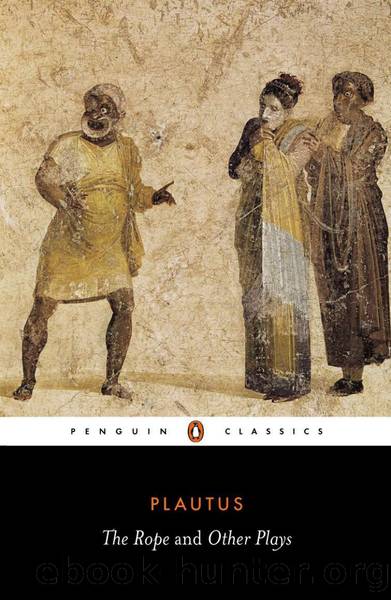The Rope and Other Plays (Penguin Classics) by Plautus

Author:Plautus [Plautus]
Language: eng
Format: epub
Tags: Classics
ISBN: 9780140441369
Amazon: 0140441360
Barnesnoble: 0140441360
Goodreads: 123920
Publisher: Penguin Group USA, Inc.
Published: 1964-05-27T23:00:00+00:00
A Three-Dollar Day
(TRINUMMUS)
INTRODUCTORY NOTE TO
A THREE-DOLLAR DAY
THE Prologue informs us that this play is derived from the Greek of Philemon, and there are reasons for believing it to be a more than usually faithful translation to which Plautus has contributed less than his usual exuberance of comic invention.
It was probably from Philemon also that Plautus derived his play Mostellaria, in which, as it happens, a similar basic situation sets the plot in motion. A young man is taking the opportunity of his father’s absence to squander the family fortune in riotous living; what will happen when the father returns? What happens in Trinummus happens only in the last few minutes of the play in a tame conclusion of reconciliation and opportune marriages. In Mostellaria, on the other hand, the father arrives on the scene early, to be made the butt of a series of practical jokes organized by a resourceful slave with the object of delaying his entry into his house.
How much of the difference between these two basically similar plays is due to Philemon and how much to Plautus is anybody’s guess. For whatever reason, what we miss in Trinummus of the Plautine comic energy is replaced by a full measure, almost to excess, of moral edification; although nearly all of it, it must be acknowledged, is quite aptly integrated into the plot.
No less than four elderly gentlemen, three of them fathers, are eloquent, in this play, with advice or reproof for their contemporaries or their juniors or society in general. Of the young men also, one, the son of a martinet father, after having on occasions rebelled against strict discipline and sampled the pleasures of freedom, has now opted for virtue and is anxious to reform his libertine friend; but the latter too, with all his weakness and waywardness, shows a gentlemanly sense of honour and some sign of affection for his father. The only slave to appear in the play is also a decent character and he too, though he is allowed some of the traditional ‘cheek’ and artfulness of his kind, gives vent to indignant strictures on the corrupt morality of the day.
With all these conscientious individuals on his hands, the author – one author or the other – was hard put to it to introduce the ‘deception’ necessary to create a comic situation. The mild deception is in fact the work of two of the respectable old gentlemen, planned for entirely altruistic ends and entrusted for its execution to the only unscrupulous character in the play, a hired impostor who would have faithfully carried out his instructions – for a fee of ‘three dollars’ – had not events made his errand abortive.
It was a characteristic quirk of Plautus to choose a tide having reference to this episode, a minor one but one which he perhaps would have liked to elaborate if he had been inclined to improve upon his model.
The play thus stands out as exceptional in mood – its nearest match is Captivi –
Download
This site does not store any files on its server. We only index and link to content provided by other sites. Please contact the content providers to delete copyright contents if any and email us, we'll remove relevant links or contents immediately.
| Ancient & Classical | Arthurian Romance |
| Beat Generation | Feminist |
| Gothic & Romantic | LGBT |
| Medieval | Modern |
| Modernism | Postmodernism |
| Renaissance | Shakespeare |
| Surrealism | Victorian |
4 3 2 1: A Novel by Paul Auster(11032)
The handmaid's tale by Margaret Atwood(6836)
Giovanni's Room by James Baldwin(5870)
Big Magic: Creative Living Beyond Fear by Elizabeth Gilbert(4717)
Asking the Right Questions: A Guide to Critical Thinking by M. Neil Browne & Stuart M. Keeley(4564)
On Writing A Memoir of the Craft by Stephen King(4205)
Ego Is the Enemy by Ryan Holiday(3982)
Ken Follett - World without end by Ken Follett(3968)
The Body: A Guide for Occupants by Bill Bryson(3789)
Bluets by Maggie Nelson(3705)
Adulting by Kelly Williams Brown(3663)
Guilty Pleasures by Laurell K Hamilton(3578)
Eat That Frog! by Brian Tracy(3505)
White Noise - A Novel by Don DeLillo(3430)
The Poetry of Pablo Neruda by Pablo Neruda(3358)
Alive: The Story of the Andes Survivors by Piers Paul Read(3302)
The Bookshop by Penelope Fitzgerald(3220)
The Book of Joy by Dalai Lama(3212)
Fingerprints of the Gods by Graham Hancock(3206)
